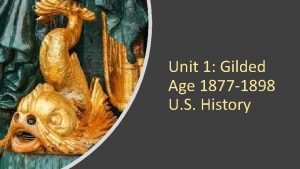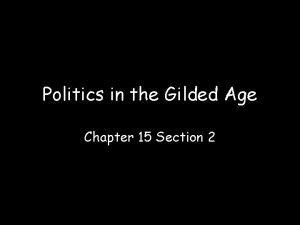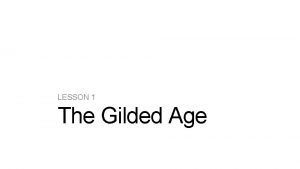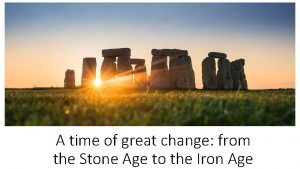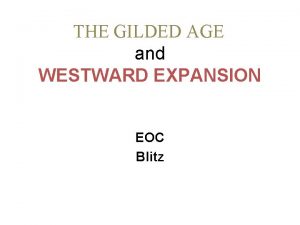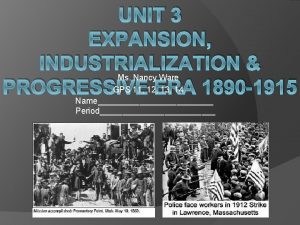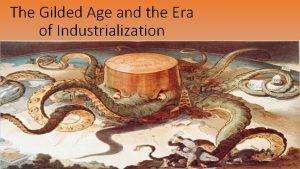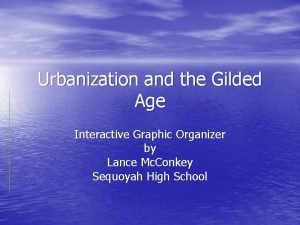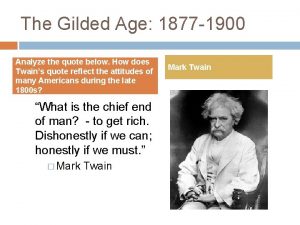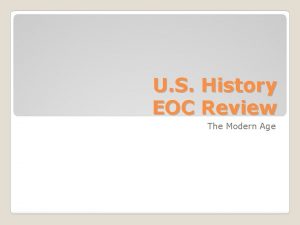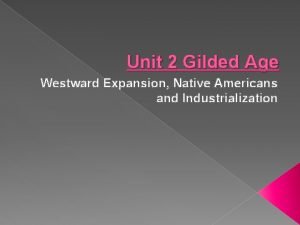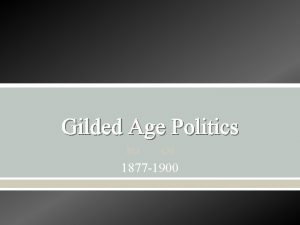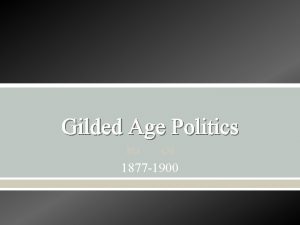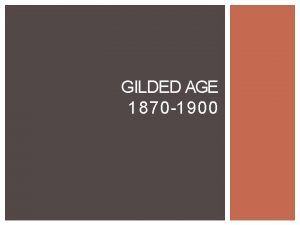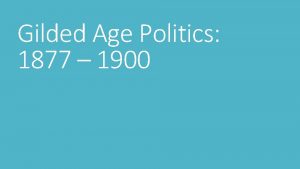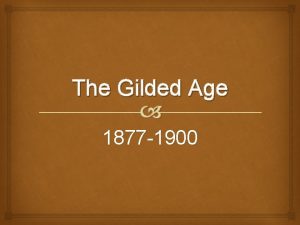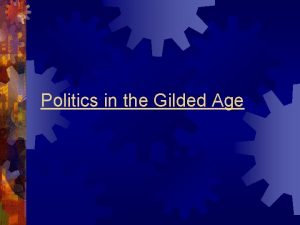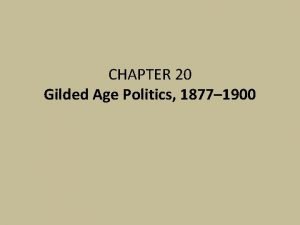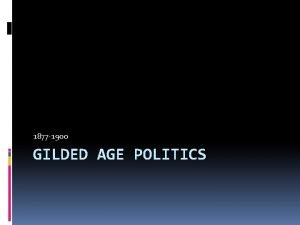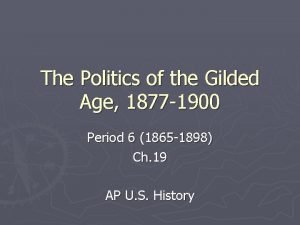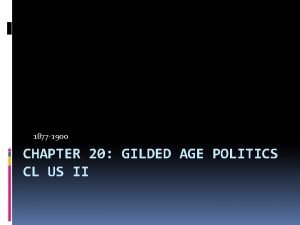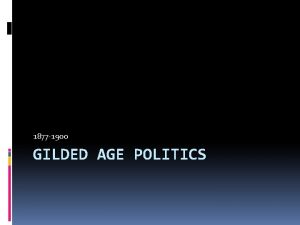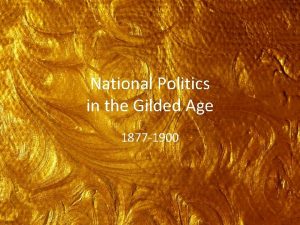Gilded Age Politics 1877 1900 The Gilded Age














- Slides: 14

Gilded Age Politics 1877 -1900

The Gilded Age Name comes from the title of an 1873 Mark Twain book o Referred to the “superficial glitter” of the new wealth that developed in the late 1800 s Dominated by a belief in limited government, laissezfaire economics, & Social Darwinism Marked by political corruption & ineffectiveness

Gilded Age Politics Era was most highly competitive politically in US history o Voter turnout reached highest levels in US history o Parties avoided controversial issues that might alienate voters o Led to issue-free campaigns focused on party loyalty & regional, religious, & ethnic ties

Political Parties Republican Party Stressed strict codes of personal morality Laissez faire attitudes on government’s involvement in regulating both economic affairs Consisted of businessmen & African Americans Support from Midwest & small & rural towns in northeast Democratic Party Opposed government efforts to impose a single moral standard on society Emphasized economic equity and fairnesss Consisted of many immigrant German Lutherans & Catholics (especially Irish) Support from the Solid South & large industrial cities where immigrants factored in significantly under political machines

Republican Factions Stalwarts, Half-Breeds, and Mugwumps o Stalwarts: Led by Roscoe Conkling, Senator who favored spoils system o Half-Breeds: Led by James G. Blaine, Congressman who favored civil service reform o Mugwumps: Represented in thought by Thomas Nast • Made up of young liberal reformers • Favored Reconstruction policies to help African Americans • Anti-corruption

Political Corruption Political Machines: Tightly organized groups of politicians that controlled the political parties in urban areas o Headed by a “boss” o Provided services to business, immigrants, & the poor in exchange for votes on election day o Exemplified by “Boss” William Tweed of the Tammany Hall machine (Tweed Ring) in NY city

Problems Lead to Political Machines • Problem: Problem Cities grow so fast their gov’t (municipal) can’t keep up with needs of people Transit, water & sewage systems, sanitation, protection • Solution: Solution Political Machine steps in and provides services in exchange for votes and money • Goal of Pol. Mach: Mach work to get their candidates elected

Political Machines: organized group that controlled things for a political party All work together To elect their Candidates & Ensure the success Of the machine city boss ward bosses precinct captains precinct workers

Immigrants and the Political Machine - Constituents (voters) are often immigrants - Bosses and precinct captains often 1 st or 2 nd generation immigrants themselves Knew the language, culture, and what was needed Immigrants taken advantage of

Corruption in the Machines Fraud: cheating to win elections ex: voting more than once Graft: using political influence for personal gain ex: Bribes - businesses offered money to get city contracts

Political Corruption Politics focused on winning and holding office, not on issues or legislation Led to an increase in patronage, i. e. giving away government offices for votes, kickbacks, & party service o Government employment expanded significantly (e. g. postal service) o Reformers targeted spoils system as being inefficient & corrupt

“Boss Tweed” * William M. Tweed was City Boss of Tammany Hall, the Democratic Pol. Mach. in NY Led ring of corrupt politicians who defrauded New York City 1869 -1871


v. Exposed for his corruption by cartoonist and editor, Thomas Nast Tweed Ring fell and 1873 Tweed convicted of embezzlement v v. Later Tweed was arrested on a civil charge and jailed in NYC, later died there
 The gilded age 1877 to 1898 worksheet answers
The gilded age 1877 to 1898 worksheet answers Chapter 7 section 3 politics in the gilded age
Chapter 7 section 3 politics in the gilded age Pallid politics in the gilded age
Pallid politics in the gilded age Chapter 15 section 3 politics in the gilded age
Chapter 15 section 3 politics in the gilded age Lesson 1 politics and the gilded age
Lesson 1 politics and the gilded age Iron age bronze age stone age timeline
Iron age bronze age stone age timeline Iron age dates
Iron age dates Gilded age westward expansion
Gilded age westward expansion Promontory point gilded age definition
Promontory point gilded age definition Vertical integration gilded age
Vertical integration gilded age Wannamaker's
Wannamaker's Gilded age quotes about poverty
Gilded age quotes about poverty Chapter 23 political paralysis in the gilded age
Chapter 23 political paralysis in the gilded age Gilded age eoc blitz review
Gilded age eoc blitz review Gilded age acrostic poem
Gilded age acrostic poem
